Top 10 Essential Herbs for Your Home Apothecary and Their Uses
Luann Morris
11/14/20252 min read


Introduction to Home Apothecary
Creating a home apothecary can be an enlightening and fulfilling journey. Herbs have been utilized for centuries for their medicinal properties and various health benefits. In this blog post, we'll explore the top 10 herbs that every home apothecary should incorporate and discuss how to use them effectively.
1. Lavender
Lavender is renowned for its calming fragrance and stress-relieving properties. It can be used in essential oil form, added to baths, or brewed into a tea to promote relaxation and soothe anxiety.
2. Peppermint
Peppermint is a versatile herb known for its invigorating scent and digestive benefits. It can be steeped in hot water to create a refreshing tea that aids digestion or applied topically in diluted form to alleviate headaches.
3. Chamomile
Chamomile is a gentle herb perfect for promoting sleep and relaxation. Typically consumed as tea, it can also be used in infusions for skin irritations, providing soothing relief.
4. Echinacea
This herb is well-known for boosting the immune system and can be particularly useful during cold and flu season. Echinacea can be taken as teas, tinctures, or capsules to help decrease the length of illnesses, such as cold or flu.
5. Ginger
Ginger has anti-inflammatory and digestive properties, making it a staple in any home apothecary. It can be consumed in tea, capsules, or used fresh to aid in digestion and ease nausea.
6. Rosemary
Loaded with antioxidants, rosemary enhances cognitive function and has anti-inflammatory benefits. It can be brewed as a tea, added to various dishes, or used in essential oil form for aromatherapy.
7. Turmeric
Known for its potent anti-inflammatory properties, turmeric is often used in cooking and can be consumed as a tea or in capsules. Its active compound, curcumin, supports overall health and wellness.
8. Thyme
Thyme is an effective herb for respiratory health and has antimicrobial properties. It can be infused in boiling water to make a soothing tea that aids in coughs or added to food for flavor and health.
9. Lemon Balm
This herb is ideal for soothing stress and anxiety. Lemon balm can be prepared as a tea or used in tinctures, providing a delightful way to enhance relaxation.
10. St. John’s Wort
Often used for mild depression and anxiety, St. John’s Wort can be consumed as tea or in extract form. It’s essential to consult with a healthcare professional due to its interaction with medications.
Conclusion
Incorporating these top 10 herbs into your home apothecary can elevate your self-care routine and promote overall wellness. Each herb comes with its unique set of benefits, making them invaluable allies in maintaining your health. Remember to consult with a qualified herbalist or healthcare provider before starting any new herbal regimen, especially if you currently take prescription medications.
